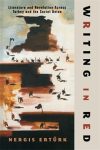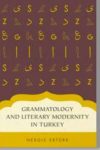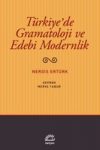
Education
Professional Bio
Nergis Ertürk is the author of two monographs: Writing in Red: Literature and Revolution Across Turkey and the Soviet Union (Columbia University Press, 2024) and Grammatology and Literary Modernity in Turkey (Oxford University Press, 2011), the recipient of the 2011 Modern Language Association (MLA) Prize for a First Book. Her work has also appeared in the journals PMLA, Modernism/Modernity, boundary 2, New Literary History, Interventions, Middle Eastern Literatures, Comparative Literature, Birikim, and Jadaliyya. Ertürk is a long-serving member of the editorial collective of boundary 2 and co-edited (with Özge Serin) of a special issue of the journal titled Marxism, Communism, and Translation. Her work on Writing in Red has been supported by a Social Science Research Council (SSRC) Fellowship for Transregional Research, an American Council of Learned Societies (ACLS) Charles A. Ryskamp Research Fellowship, and a residency at the Institute for Advanced Study (IAS) in Princeton.
Since 2023, Ertürk has served as the editor of the journal Comparative Literature Studies, published by the Department of Comparative Literature at Penn State. CLS reflects our departmental ethos of openness to variance in critical epistemologies and methodologies. The specific editorial projects she has curated for the journal reflect Ertürk’s commitment to grounding comparative literary studies in underrepresented minor literatures. Published and forthcoming forums on Gayatri Spivak’s Death of a Discipline and the imperatives of comparatism, on Persianate modernity, and on creolity and ajami worlds showcase groundbreaking works by senior and junior scholars that push disciplinary boundaries.
At the graduate level, Ertürk teaches courses in postcolonial studies, Cold War studies, East-East literary relations, and literary and cultural theory, including theories of gender and sexuality. Recent graduate seminars include “The Global Cold War: Translation, Aesthetics, Politics,” “Gender and Sexuality in the (Post)colony,” and “Comparative Criticism II: Romantic to Contemporary.” At the undergraduate level, she teaches courses in comparative literature with a focus on race, gender, and identity in world literature, including an introduction to comparative literature (“Reading Across Cultures”) and a capstone senior seminar on literary criticism and theory.
AREAS OF SPECIALIZATION
- Modern Turkish literature, culture, and intellectual history
- Early Soviet literature and culture
- Global Cold War and East-East literary relations
- Postcolonial theory
- Gender, sexuality, and Islam
- Comparative modernisms and peripheral realisms
- Twentieth-century literary criticism and theory




